Six conclusions from E3 Saxo Bank Classic and Gent-Wevelgem
Van Aert bounces back, Deceuninck-QuickStep's flipping fortunes and Bora-Hangrohe's lack of COVID-19 perspective
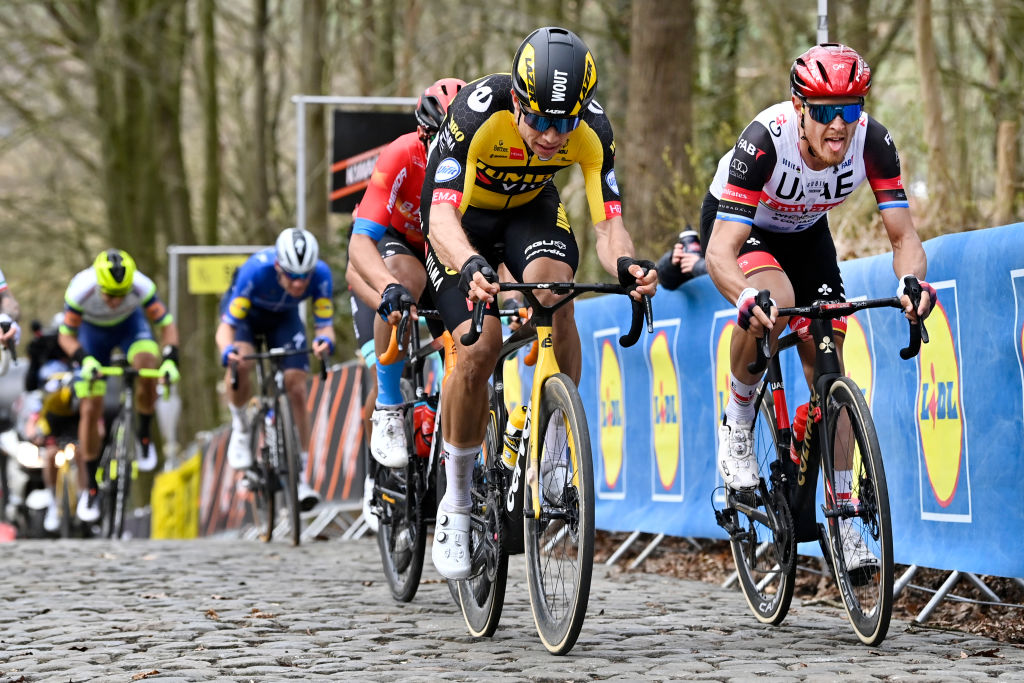
Wout van Aert (Jumbo-Visma) claimed his first classic of the season at Gent-Wevelgem after yet another unpredictable, aggressive and highly entertaining race.
The break of the day formed with 180km still to race, sparking a number of surprises and matter for debate.
After struggling at the E3 Saxo Bank Classic, Van Aert was back to his best and victory in the sprint ahead of Giacomo Nizzolo (Qhubeka Assos) and Matteo Trentin (UAE Team Emirates) makes him a logical favourite for next Sunday's Tour of Flanders.
Deceuninck-QuickStep's fortunes flipped after their dominance on Friday, with Sam Bennett taken out of contention during the flat run-in to the finish after overeating and vomiting.
Now the days count down to the Tour of Flanders, with Julian Alaphilippe and Mathieu van der Poel also expected to play huge roles in the Ronde.
The spring Classics seem to be getting better race after race, with lots of details to analyse, conclusions to debate and more to look forward to.
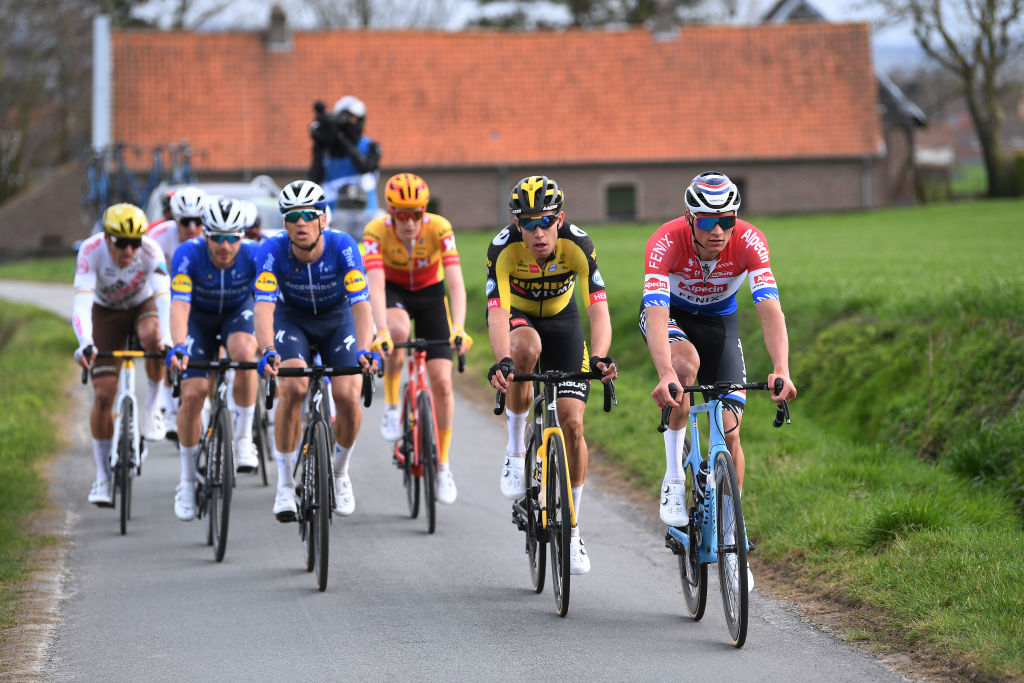
Big Three still closely matched ahead of the Tour of Flanders
In years past – especially when Fabian Cancellara was in his pomp – the result of the Tour of Flanders occasionally felt preordained after the dress rehearsal at the race then known as the E3 Harelbeke. There is no such certainty this spring, where each race seems to be gently contradicted by the next.
Get The Leadout Newsletter
The latest race content, interviews, features, reviews and expert buying guides, direct to your inbox!
The trend continued this past weekend. After Kasper Asgreen (Deceuninck-Quickstep) soloed to victory in Harelbeke on Friday at the E3 Saxo Bank Classic, the cobbled Classics appeared to be taking on a familiar hue. By outlasting Wout van Aert (Jumbo-Visma) and outmanoeuvring Mathieu van der Poel (Alpecin-Fenix), Deceuninck-QuickStep’s collective looked to have the upper hand. Without turning a pedal in anger, the absent Julian Alaphilippe’s Ronde credentials were suddenly enhanced.
Just 48 hours later, Deceuninck-QuickStep were, with the notable exception of Sam Bennett, conspicuously absent from the front when the Gent-Wevelgem peloton splintered into echelons. Van Aert, distanced after attacking in the finale in Harelbeke, was untouchable here and the strength of his team, much criticised after E3, was also crucial, with Nathan Van Hooydonck playing a key role in teeing up his victory.
Van der Poel, who looked unbeatable after his feats of strength at Strade Bianche and Tirreno-Adriatico, was more vulnerable at Milan-San Remo and E3 Harelbeke, yet still capable of travelling to places no-one else could reach with his accelerations. The Dutchman sat out Gent-Wevelgem but returns at Dwars door Vlaanderen on Wednesday, as does Alaphilippe. With Van Aert an absentee, the parcel of Ronde favourite might well be passed on again midweek.
In other words, a week out from the Tour of Flanders, the lie of the land is pretty much as it was before the Classics began. The Big Three of Van Aert, Van der Poel and the Deceuninck-QuickStep collective look to be well out in front, but it’s not entirely clear just where the balance of power lies between them. In a relentless spring, it’s all about the next race.
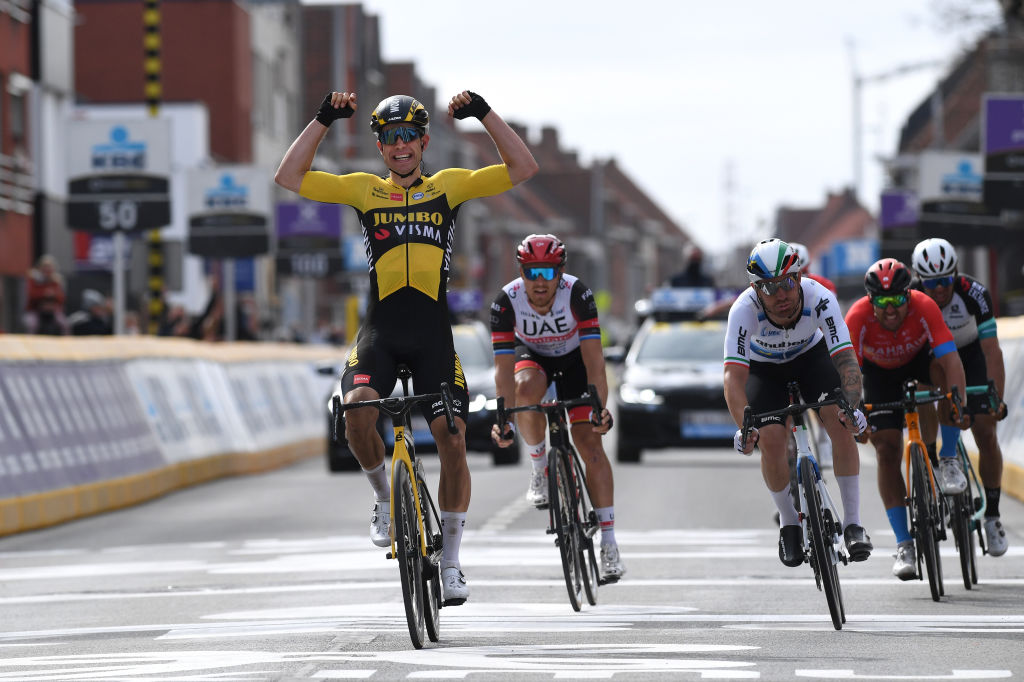
Van Aert cuts his cloth to size and wins in Wevelgem
Wout van Aert has taken to winning on just about every kind of terrain since he took to the road three years ago, but for all his élan on the cobbles, before this weekend he was yet to win a Flemish Classic.
At the E3 Saxo Bank Classic on Friday, Van Aert was perhaps a victim of his own eagerness to break that duck, or perhaps simply blinded by his own sparkling form. After regaining contact with Van der Poel et al following his puncture, he seemed to make a point of showcasing his condition with long turns on the front and, above all, by accelerating from the front on the Tiegemberg.
The tactic backfired and he was unceremoniously distanced once Van der Poel took over, but Van Aert is nothing if not a quick learner. After vying to claim the strongest man contest on Friday he settled for doing enough to win the bike race on Sunday. Van Aert was present and correct when the key split formed with 180 kilometres to go and he rode wisely thereafter. He used teammate Nathan Van Hooydonck as and when required, while doing just enough on the Kemmelberg to stretch the fast men to breaking point without overextending himself.
“It’s not about being the best during the race, it’s about being the best at the finish line,” Van Aert said after he dispatched Giacomo Nizzolo (Qhubeka Assos), Matteo Trentin (UAE Team Emirates) et al in the seven-up sprint.
As in 2019 and 2020, Van Aert lines up for the Ronde as a favourite, but this time out, he will set out from Antwerp with a touch more confidence.
“It’s more fun to be the top favourite with a win in the bag,” he said on Sunday.
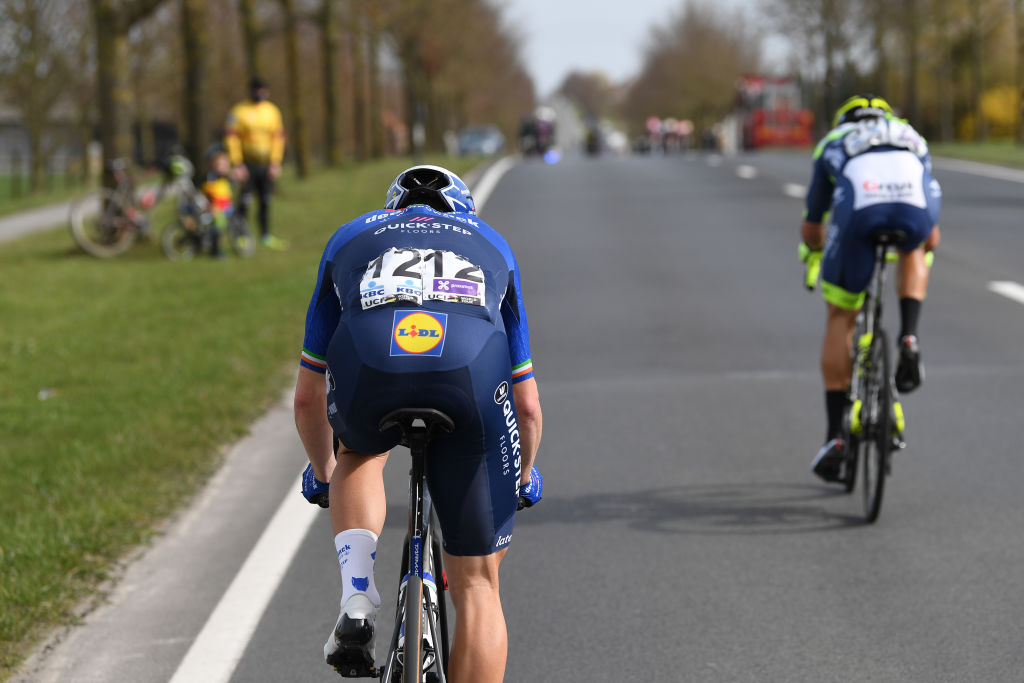
Deceuninck-QuickStep’s Gent-Wevelgem off-day was an anomaly
Sam Bennett’s fine display almost papered over the cracks but Deceuninck-QuickStep endured a wretched outing at Gent-Wevelgem. Two days after a masterclass in, er, wolfpackery on the road to Harelbeke, Deceuninck-QuickStep found themselves engaged in something closer to an exercise in herding cats at Gent-Wevelgem.
Caught on the backfoot by that early split, the team never managed to marshal a coherent pursuit in a fragmented peloton. With Bennett isolated in the front group, Yves Lampaert and Zdenek Stybar made attempts to bridge across, but without ever really threatening to make contact. Lampaert was still giving chase by the time Bennett fell victim to a hunger flat in the finale, but by then, the damage was already done.
Yet for all that, Gent-Wevelgem had the feel of an anomaly rather than a deeper malaise. The race is prey to crosswinds in a way that the Tour of Flanders typically isn’t and it’s hard to imagine Stybar, Lampaert et al missing out in echelons again any time soon once they’ve had a gentle debrief from directuer sportif Wilfried Peeters.
Lampaert’s forlorn late pursuit at least showcased his form, while it’s worth remembering that Deceuninck-QuickStep were also without both Alaphilippe and the on-form Asgreen on Sunday.
Over the years, QuickStep typically responded to setbacks at Omloop Het Nieuwsblad with shows of force at Kuurne-Brussel-Kuurne. It would be a surprise if the empire didn’t strike back in the week ahead, particularly when Alaphilippe and Asgreen are back in situ.
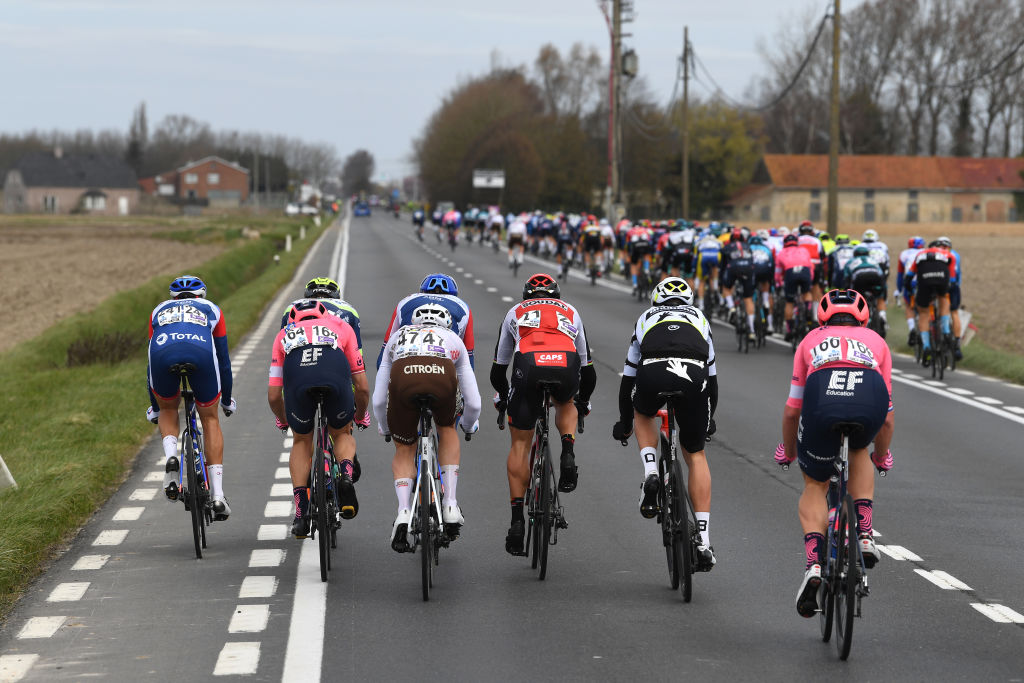
The chasing pack have ground to make up
If Deceuninck-QuickStep’s struggles at Gent-Wevelgem could be put down to an off-day, Lotto Soudal and AG2R Citroën’s displays were in keeping with their Classics campaigns to date.
Jasper De Buyst was the only Lotto Soudal rider to make the initial split, but he lost contact relatively early. Philippe Gilbert was prominent in the opening kilometres but, as at Harelbeke on Friday, he failed to finish the race, while John Degenkolb came home a low-key 29th in Harelbeke and 27th in Wevelgem.
AG2R Citroën’s tandem of Oliver Naesen and Greg Van Avermaet were at least in contention at the E3 Saxo Bank Classic, making the winning move and coming home in fourth and sixth, respectively, even if neither man looked capable of troubling Deceuninck-QuickStep or Van der Poel.
“Collectively, Greg and I rode a good race, but it is clear that we are not a favourite for the Tour of Flanders,” Naesen acknowledged afterwards.
Both Van Avermaet and Naesen missed the split on Sunday, and while teammate Michael Schär did his bit to try to bring them back into the contention, AG2R Citroën hasn’t yet manifested itself as a collective force this spring.
It was a subdued weekend, too, for Team DSM. Søren Kragh Andersen caught the eye at Milan-San Remo and Tiesj Benoot again impressed at Paris-Nice, but neither rider made the kind of impact he would have liked at the E3 Saxo Bank Classic or Gent-Wevelgem. Benoot was 15th in Harelbeke but sat out Gent-Wevelgem.
For Ineos Grenadiers, Dylan van Baarle was at least a part of the decisive move at Harelbeke, while Trek-Segafredo’s readiness for the Ronde was dealt a blow by the COVID-19 cases that forced them out of Gent-Wevelgem.
After a puncture proved costly at Harelbeke, Matteo Trentin (UAE Team Emirates) underlined his form with third place in Wevelgem – but Van der Poel, Van Aert and Deceuninck-QuickStep still seem out of reach for most.
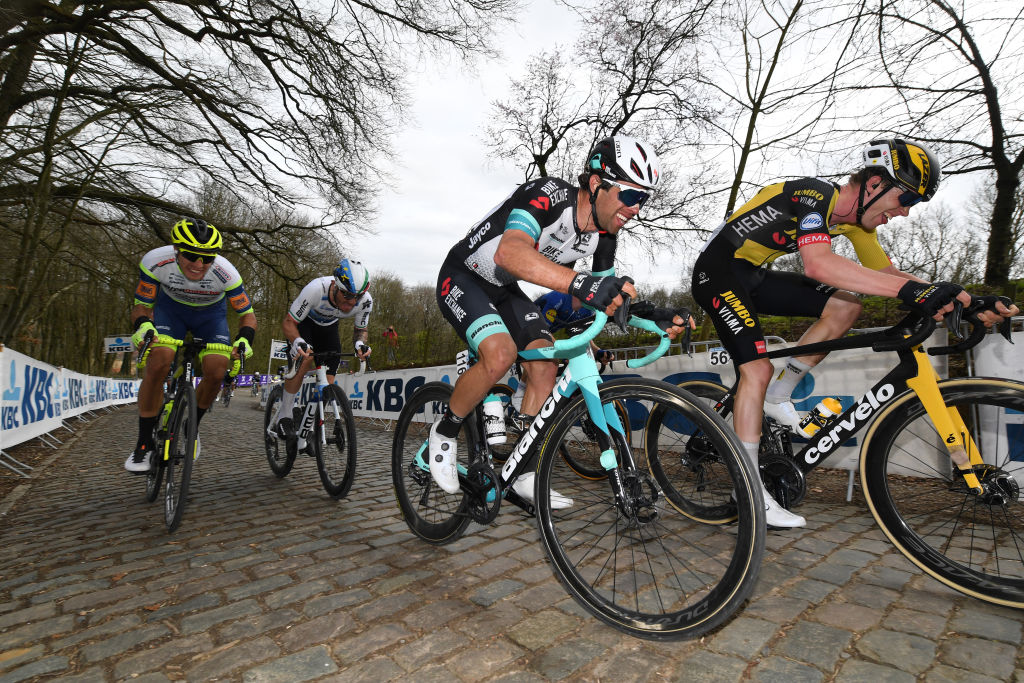
Mixed messages for Matthews
Michael Matthews and Team BikeExchange got a great many things right at Gent-Wevelgem. Jack Bauer, Luka Mezgec and Robert Stannard were to the fore in forcing the decisive echelon with 180 kilometres to go, and their work helped to ensure it stayed clear of the chasers all the way to the finish.
Once the front group began to fragment on the climbs and the Plugstreets, Matthews was always to the fore, matching Van Aert and the strongmen pedal stroke for pedal stroke and outlasting riders like Bennett and Danny van Poppel (Intermarché-Wanty Gobert). Five of the seven riders who reached the finish together would have fancied their chances in a sprint and while Van Aert was, on form, the favourite Matthews would, on pedigree, have expected to come a lot closer than fifth.
The Australian could be seen slapping his legs on the run-in, however, and he admitted afterwards that he had been beset by cramp in the finale.
“I started to get double cramp in both my legs,” Matthews said. “That’s unfortunate, but it was a really hard day.”
Such are the vagaries of the Classics – even Cancellara was knotted with cramp at the finish of the 2008 Paris-Roubaix – but Matthews might wonder, too, if his chances on the cobbles might have been better served by starting his season a little earlier.
Instead, as per his custom, Matthews preferred to train in February and only began his campaign at Paris-Nice. He has been consistent, wearing the yellow jersey at the Race to the Sun and placing sixth at Milan-San Remo, but he also seemed a little short of sharpness.
Then again, there is method to Matthews’ build-up. His Spring campaign is longer than most, after all, with Dwars door Vlaanderen, the Tour of Flanders, Brabantse Pijl, Amstel Gold Race and Liège-Bastogne-Liège all on his calendar. Gent-Wevelgem was a missed opportunity that still offered encouragement.
“I think every race day I’m getting better and better,” he said with optimism.
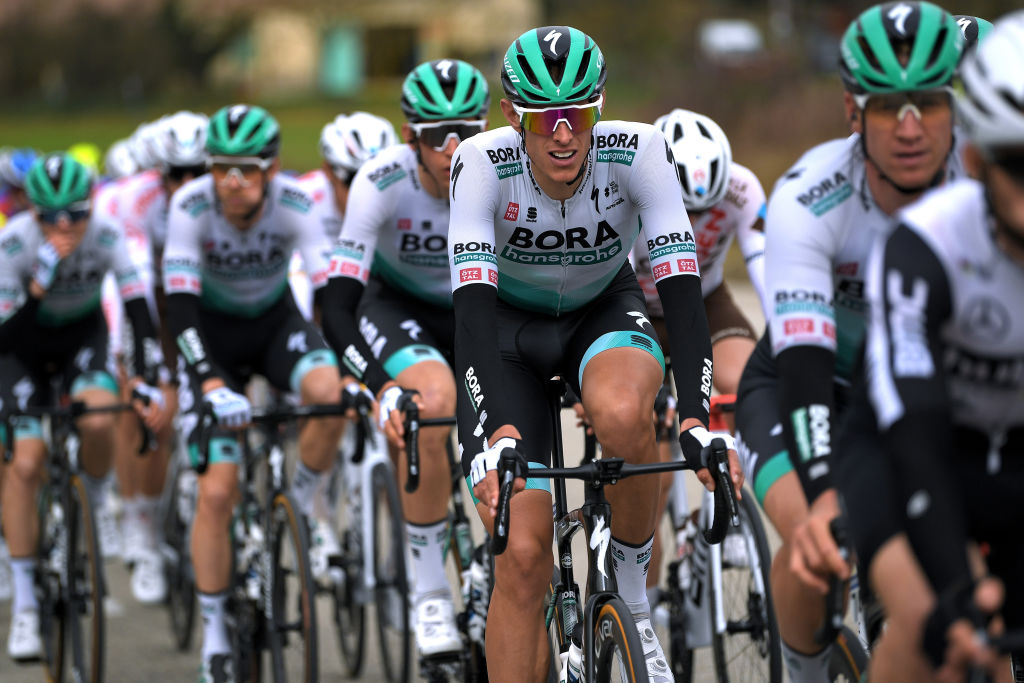
Denk’s COVID-19 complaint lacks perspective
Despite missing the E3 Saxo Bank Classic due to Matt Walls’ positive test for COVID-19, Bora-Hansgrohe had evinced confidence that they would be permitted to start Gent-Wevelgem. Reports in the Belgian press on Saturday suggested that at least some of their riders would be compelled to quarantine for seven days, however, and on Sunday morning it was confirmed that Bora-Hansgrohe would not be permitted to race. They will now also miss Dwars door Vlaanderen on Wednesday.
The decision drew the irritation of manager Ralph Denk, who blamed the designated COVID-19 race doctor for the E3 Saxo Bank Classic for placing “two-thirds of the team” in a seven-day quarantine.
“A GP from the region can block an entire team in one of the largest one-day races in the world,” Denk lamented in a statement heavy with anger but light on self-awareness.
While Denk is entitled to feel frustrated, it seems to have escaped his notice that professional cycling does not exist in a vacuum. Gent-Wevelgem was held on roads largely bereft of fans due to the stringent COVID-19 restrictions in place in Belgium.
The restrictions there – and all around the world – have seen large parts of society shut down and vast numbers of people forced into unemployment, while the pandemic continues to saturate intensive care units and stretch health services. Against that backdrop, it’s perhaps fortunate that any bike races are taking place at all and where they do, they must comply with local health regulations.
The decision to impose quarantine was taken with that context in mind, as Flanders Classics CEO Tomas Van Den Spiegel pointed out.
“There’s the fact that 17 people from Bora have been marked as high-risk contacts,” he said. “Once they’re quarantined, there’s not much we can do.”
The inconsistencies between different countries’ COVID-19 rules may be frustrating and Belgium’s quarantine process might seem arbitrary to Denk, but people around the globe have seen their lives grind to a halt due to rolling lockdowns of varying degrees of severity. Missing three bike races, in the grand scheme of things, is hardly the heaviest burden to bear. Besides, Denk’s team was still winning in recent days, with Lennard Kämna and Peter Sagan landing back-to-back stages at the Volta a Catalunya.
That’s the same Sagan, incidentally, whose early season plans were redrawn when he had to quarantine after contracting COVID-19 at a training camp in Gran Canaria. He now travels north for the Tour of Flanders. It remains to be seen if he has recovered quickly enough to be truly competitive at a race like that, but after fourth place at Milan-San Remo, it was another firm reminder that he is on the road back.
Bora-Hansgrohe’s spring is far from over, despite Denk’s lamentations.

Barry Ryan was Head of Features at Cyclingnews. He has covered professional cycling since 2010, reporting from the Tour de France, Giro d’Italia and events from Argentina to Japan. His writing has appeared in The Independent, Procycling and Cycling Plus. He is the author of The Ascent: Sean Kelly, Stephen Roche and the Rise of Irish Cycling’s Golden Generation, published by Gill Books.